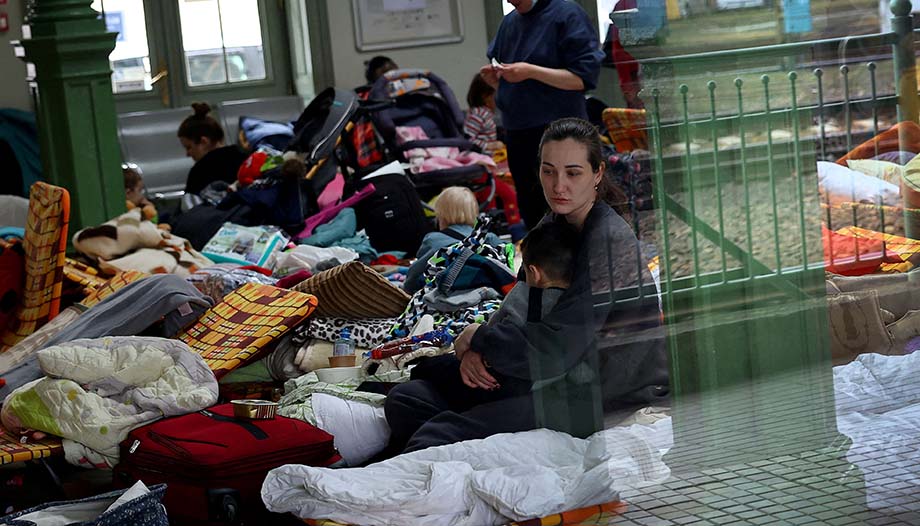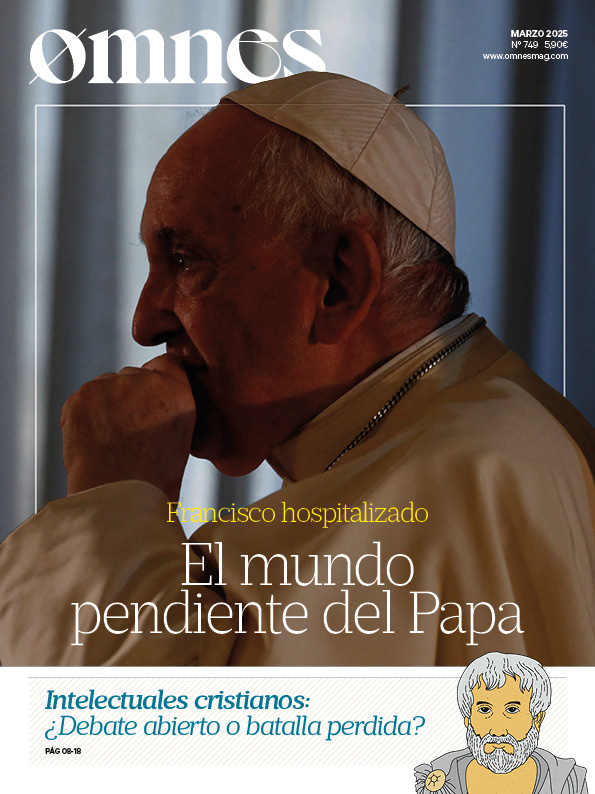Organized or private initiatives, by car, on foot... go to the borders and bring blankets, warm food and clothes. They pick up women, old people, children and take them to safe places. They wait for them with gifts at the train or bus stations...
"In all the dioceses of Poland, concrete help has been organized for refugees and people who have remained in Ukraine. Religious houses, Caritas centers, parish houses have opened their doors to those in need and to those seeking refuge during this difficult time," relates to Omnes Fr. Jakub J. Szyrszeń, a priest of the diocese of Krakow who, although he is in Spain at the moment, remains in direct contact with his country.
Some diocesan initiatives
In the Archdiocese of Krakow, Archbishop Marek Jędraszewski has created a team to help Ukraine and refugees arriving in the archdiocese. Caritas Poland and coordinates actions for the refugees who already exceed thousands through the various diocesan Caritas.
Centers, parish and retreat houses, schools or seminaries such as the one in Szczecin or Silesia have become shelters, and the Church is preparing more places to take care of all Ukrainians, especially women, children and elderly people who cross the border fleeing from the Russian military action.
A country with no refugee camp is already hosting hundreds of thousands of people, in fact, Caritas Poland plans to set up 20 aid centers for immigrants throughout Poland.
Fr. Jakub J. Szyrszeń recalls that "on Sunday and Ash Wednesday, collections were held in churches, the proceeds of which will be entirely allocated to help Ukraine. In every parish of the Archdiocese of Krakow you can take basic necessities to make them reach both Ukraine and the refugees, whom we will welcome here. Five of our priests are currently working in Ukraine and we are trying to ensure that humanitarian aid reaches their parishes through Caritas."
The dioceses of Zamość-Lubaczów and the Archdiocese of Lublin, three dioceses bordering Ukraine cooperate with the Border Guard and the Customs and Tax Service, which coordinate the influx of refugees to welcome and assist those passing into Poland fleeing the war.
Przemyśl, on the border with Ukraine, is one of the "hot spots" of this situation. There, Caritas prepares, daily, about 5,000 food rations for refugees and about 200 for law enforcement, doctors and volunteers that are distributed at the Przemyśl train station where thousands of people arrive every day. In addition to these meals, they distribute sandwiches, sweets, blankets, cots, and do activities for children not only at the station but also in different parts of the city.
The parish of Łomianki, belonging to the Archdiocese of Warsaw, is already hosting 700 refugees. Many of them, after spending the first hours in the parish premises, have been taken in by families of the parish. Volunteers of all ages are packing food, gifts, toys and clothes for the refugees. Others have organized vehicles to bring the refugees from the border as soon as possible.
The Archbishop of Katowice, Wiktor Paweł Skworc, has asked that, where possible and when necessary, parish structures (rooms, catechetical houses, free premises and apartments) and religious houses be made available to welcome the people who, for days now, have not ceased to arrive in Poland.
One of the first aid items to arrive on Ukrainian soil came from Caritas of the Archdiocese of Gdansk. Two vans loaded with basic goods were sent from Gdansk: long-lasting food, medicines, personal hygiene products and toys for children. Thanks to the extraordinary mobilization of Caritas workers and the good organization of the work, it was possible to fill the space of the vans very quickly and to the maximum. This aid, which in a few hours became too little because of the worsening of the conflict.
The Polish religious communities are being one of the key pillars in this aid to the refugees and the people of Ukraine. Many of these communities are in contact with their brothers in Ukraine, providing them with all possible assistance, such as the Jesuits who have created a team coordinated by the two Jesuit provinces in Poland, which organizes aid to refugees and support to Jesuits operating in the areas covered by the war. From Poland they prepare accommodation for refugees, transport gifts and people, and offer psychological support.
In Jasna Góra, the center of the Marian heart of Poland, the Pilgrim's House is already welcoming the first refugees. From the very beginning of the war, the Paulines who guard the shrine declared that they would welcome those seeking refuge and help.
A package for Ukraine
Caritas Poland has also launched a new campaign from March 4 "A Package for Ukraine". What is it about? Polish families, parish communities, Caritas school clubs and Caritas parish teams will be able to prepare packages of no more than 20 kg with the most necessary goods for a particular family. The package will be accompanied by a letter with words of support and will be sent to Ukraine.
Welcoming and prayer
In his Lenten message, Archbishop Stanisław Gądecki President of the Polish Bishops' Conference thanked "every kind word and the smallest gestures of kindness addressed to our suffering brothers and sisters. Let us surround them with prayer, show cordiality, help them find work" and encouraged the faithful to pray for Russia. "There will be no peace in our part of the world until Russia returns to Christ," he noted.
Not only help, but also prayer for peace. The shrine of Jasna Góra, hosts a constant prayer for peace in Ukraine, especially before the Blessed Sacrament, permanently exposed.
Refugee at home, God at home
A sign of fraternity, of the Christian charity of the Polish people, which the Pope Francis wanted to highlightr at the audience on Wednesday, March 2, addressing the Bishops and the Polish people with these words: "You were the first to support Ukraine, opening your borders, your hearts and the doors of your homes to Ukrainians fleeing the war. You generously offer them everything they need to live with dignity, despite the drama of the moment. I am deeply grateful to them and bless them with all my heart."
"For the Church in Poland this Lent is a great catechesis on love of neighbor" notes priest Jakub J. Szyrszeń who recalls a Polish saying "Guest in the house, God in the house". During these weeks, in many homes in Poland, God will have a place in the eyes of those who have fled an imposed and terrible war.








